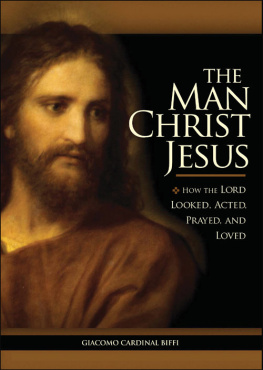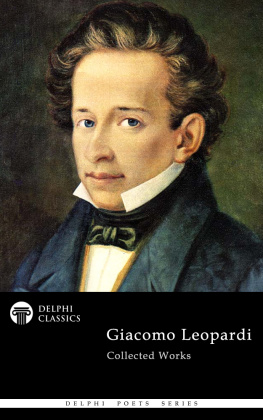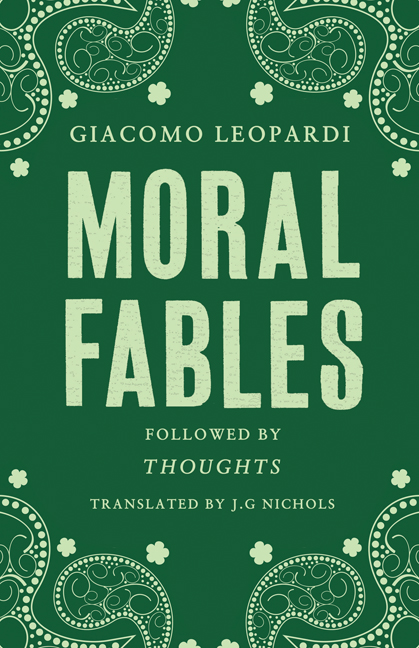Moral Fables
followed by
Thoughts
Giacomo Leopardi
Translated by J.G. Nichols
ALMA CLASSICS
alma classics
an imprint of
Alma BOOKS
Castle Yard
Richmond
Surrey TW10 6TF
United Kingdom
Moral Fables first published in Italian in 1824
This translation first published by Alma Books Ltd in 2017
Thoughts first published in Italian in 1837
This translation first published by Hesperus Press Ltd in 2002
First published in a revised version by Alma Books Ltd in 2017
Translation, Notes and Extra Material J.G. Nichols 2002, 2017
Printed in Great Britain by CPI Group (UK) Ltd, Croydon CR0 4YY
isbn : 978-1-84749-580-8
All the pictures in this volume are reprinted with permission or presumed to be in the public domain. Every effort has been made to ascertain and acknowledge their copyright status, but should there have been any unwitting oversight on our part, we would be happy to rectify the error in subsequent printings.
All rights reserved. No part of this publication may be reproduced, stored in or introduced into a retrieval system, or transmitted, in any form or by any means (electronic, mechanical, photocopying, recording or otherwise), without the prior written permission of the publisher. This book is sold subject to the condition that it shall not be resold, lent, hired out or otherwise circulated without the express prior consent of the publisher.
Contents
Moral Fables
They say that in the beginning all the inhabitants of the world were created at one and the same time everywhere, and all of them as children, and that they were nurtured by the bees, the goats and the doves, just as the poets fabled concerning Joves upbringing. And that the earth was much smaller than it is now, almost all the land flat, the sky without stars, the sea not yet created, and that there was much less variety and splendour in the world than we see today. Men nevertheless took an insatiable pleasure in observing and considering the sky and the earth, marvelling at them and thinking them both beautiful and not merely vast but infinite, in extent as in majesty and grace. They fed themselves besides with the most joyful hopes and, taking unbelievable delight in every emotion they felt, grew up in great contentment, almost believing that they were happy. Having spent their childhood and early adolescence so pleasantly, and coming to a time of greater maturity, they started to sense a certain change. Their hopes, which up to then they had gone on deferring from day to day, without their having yet come into effect, seemed to them to deserve little credence; and the idea of being content with what they enjoyed at present, without the promise of any increase of their well-being, did not attract them. This was above all because the appearance of natural things and every detail of their daily lives, either through long custom or through a decline of mans primeval mental vivacity, fell far short of being as delightful and pleasing to them as in the beginning. They roamed over the earth and visited the most distant places, since they could do that easily, the land being flat and not divided by seas, and there being no other difficulty to impede them; and after many years most of them realized that the earth, although big, was established within certain bounds which were not so wide as to be beyond comprehension, and that all places on earth and all men were, with only slight differences, like one another. For which reasons their discontent increased so much that, before they had left their youth behind, an overt distaste for their existence took universal possession of them. And gradually during their maturity, and even more in their declining years, as satiety turned to hatred, some of them were filled with such desperation that, unable to bear the light and the breath of life, which in early times they had so much loved, they spontaneously, some in one way and some in another, deprived themselves of them.
This situation horrified the gods that living creatures preferred death to life, and that life itself in some of its own subjects, without the force of necessity or any other influence, should be the instrument of their destruction. Nor is it easy to say how surprised they were that their gifts were held to be so contemptible, so abominable that anyone should make every effort to divest himself of them and reject them; for it seemed to the gods that they had placed in the world so much goodness and charm, and such arrangements and circumstances, that this dwelling place ought to be not merely tolerated, but most dearly loved by any creature and most of all by men, that race they had taken particular care to bring to a state of wonderful excellence. But at the same time, besides being touched in no small way by pity for so much human misery as events revealed, the gods even feared that, if these sad examples were to be repeated and multiplied, the human race in a short time, against the decrees of the Fates, would come to perish, and everything would be deprived of that perfection which our species bestowed upon it, and they themselves of those honours which they received from men.
Jove decided therefore to improve the human condition, since that seemed to be required, and with greater favours to guide men towards happiness; and he realized that men complained mainly that things were neither of such immense size nor infinite in beauty, perfection and variety as they had at first thought them to be; things were on the contrary very restricted, all of them imperfect, and almost all shaped alike; and he saw that men, deploring not only increasing age, but their time of maturity, and even youth itself, and desiring the sweetness of their early years, prayed fervently to be restored to childhood, and to remain in that state all their lives. In this Jove was unable to satisfy them, since it would be contrary to the universal laws of nature and to those duties and services that men should, in accordance with divine decree, perform and provide. Neither could he communicate his own infinity to mortal creatures, or make matter infinite, or make the perfection and happiness of things and men infinite. It seemed good to him, therefore, to broaden the bounds of creation, to adorn it more and make it more varied; and once he had taken this decision, he enlarged the earth all round, and poured the sea into it so that, being interposed between the inhabited areas, it diversified the appearance of things and, by interrupting travel, prevented their bounds being easily known to men, and so presented to the eye a lively semblance of immensity. At that time those new waters covered the land of Atlantis, and not that alone, but other vast and innumerable tracts, although of Atlantis there is a particular memory, one that has survived over countless centuries. Many places he lowered, many he filled up by raising mountains and hills; he sprinkled the sky with stars, refined and purified the nature of the air and increased the brightness of daylight; he deepened the colours of the sky and the countryside and made them more various than before, and confused the generations of men so that the old age of some coincided with the youth and childhood of others. And, resolving to multiply the appearances of that infinitude which men desired above all (since he could not gratify them with the reality) and wishing to feed and encourage their imaginations (from which he understood the great blessedness of their childhood had principally proceeded), among the many expedients which he adopted (like that of the sea) he created echoes, which he hid in the valleys and caves, and he placed a deep, hollow murmur in the woods, together with a vast swaying of their treetops. In the same way, Jove created the crowd of dreams, and charged them with deceiving, under various guises, the thoughts of men, and with suggesting to men that fullness of incomprehensible happiness which he saw no way to bring about in reality; Jove charged them also with suggesting those confused and indefinite images of which he himself, even if he had wished to and men had ardently desired it, could not produce one actual example.












